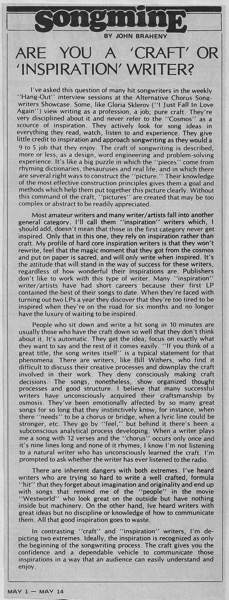A John Braheny Songmine column from the archives…

Accession Number: C000000137-030-002Document/Digital File, “Songmine: Are You A ‘Craft’ Or ‘Inspiration’ Writer? by John Braheny”, OCR converted text under same Accession Number
(Digitally converted text. Some errors may occur)
Songmine By John Braheny
Are You A ‘Craft’ Or ‘Inspiration’ Writer?
I’ve asked this question of many hit songwriters in the weekly “Hang-Out” interview sessions at the Alternative Chorus Song-writers Showcase. Some, like Gloria Sklerov (“I Just Fall In Love Again”) view writing as a profession, a job; pure craft. They’re very disciplined about it and never refer to the “Cosmos” as a scource of inspiration. They actively look for song ideas in everything they read, watch, listen to and experience. They give little credit to inspiration and approach songwriting as they would a 9 to 5 job that they enjoy. The craft of songwriting is described, more or less, as a design, word engineering and problem-solving experience. It’s like a big puzzle in which the “pieces” come from rhyming dictionaries, thesauruses and real life, and in which there are several right ways to construct the “picture.” Their knowledge of the most effective construction principles gives them a goal and methods which help them put together this picture clearly. Without this command of the craft, “pictures” are created that may be too complex or abstract to be readily appreciated.
Most amateur writers and many writer/artists fall into another general category. I’ll call them “inspiration” writers which, I should add, doesn’t mean that those in the first category never get inspired. Only that in this one, they rely on inspiration rather than craft. My profile of hard core inspiration writers is that they won’t rewrite, feel that the magic moment that they got from the cosmos and put on paper is sacred, and will only write when inspired. It’s the attitude that will stand in the way of success for these writers, regardless of how wonderful their inspirations are. Publishers don’t like to work with this type of writer. Many “inspiration” writer/artists have had short careers because their first LP contained the best of their songs to date. When they’re faced with turning out two LPs a year they discover that they’re too tired to be inspired when they’re on the road for six months and no longer have the luxury of waiting to be inspired.
People who sit down and write a hit song in 10 minutes are usually those who have the craft down so well that they don’t think about it. It’s automatic. They get the idea, focus on exactly what they want to say and the rest of it comes easily. “If you think of a great title, the song writes itself” is a typical statement for that phenomena. There are writers, like Bill Withers, who find it difficult to discuss their creative processes and downplay the craft involved in their work. They deny consciously making craft decisions. The songs, nonetheless, show organized thought processes and good structure. I believe that many successful writers have unconsciously acquired their craftsmanship by osmosis. They’ve been emotionally affected by so many great songs for so long that they instinctively know, for instance, when there “needs” to be a chorus or bridge, when a lyric line could be stronger, etc. They go by “feel,” but behind it there’s been a subconscious analytical process developing. When a writer plays me a song with 12 verses and the “chorus” occurs only once.and it’s nine lines long and none of it rhymes, I know I’m not listening to a natural writer who has unconsciously learned the craft. I’m prompted to ask whether the writer has ever listened to the radio.
There are inherent dangers with both extremes. I’ve heard writers who are trying so hard to write a well crafted, formula “hit” that they forget about imagination and originality and end up with songs that remind me of the “people” in the movie “Westworld” who look great on the outside but have nothing inside but machinery. On the other hand, Ive heard writers with great ideas but no discipline or knowledge of how to communicate them. All that good inspiration goes to waste.
In contrasting “craft” and “inspiration” writers, I’m de-picting two extremes. Ideally, the inspiration is recognized as only the beginning of the songwriting process. The craft gives you the confidence and a dependable vehicle to communicate those inspirations in a way that an audience can easily understand and enjoy.
MAY 1 – MAY 14
See all previous entries in the Songmine Series
About Songmine and Music Connection Magazine:
John Braheny met Eric Bettelli and Michael Dolan right before they were going to publish Music Connection magazine. Eric and Michael wanted to get their publication out to as many songwriters as they could. They had already heard of the LA Songwriters Showcase, and of John and his partner, Len Chandler. John’s goal was to advertise the schedule of guest speakers and performers at the weekly Showcase… so they made a deal.
They published John’s Songmine column (he had never before written a magazine article!) in their very first edition, in November 1977. Trading out the column for advertising, this arrangement continued for many years. Plus, Eric and Michael came to the Showcase each week and distributed free copies to the songwriters!
Those articles became so popular that (book agent and editor) Ronny Schiff offered John’s articles to F&W Media, where they became the backbone of John’s textbook, The Craft and Business of Songwriting. As a follow-up, Dan Kimpel (author, songwriter, teacher), who had also worked at LASS, took on the Songwriting column at Music Connection magazine which continues to this day! You can subscribe to get either hard copies or online.
No comments yet.